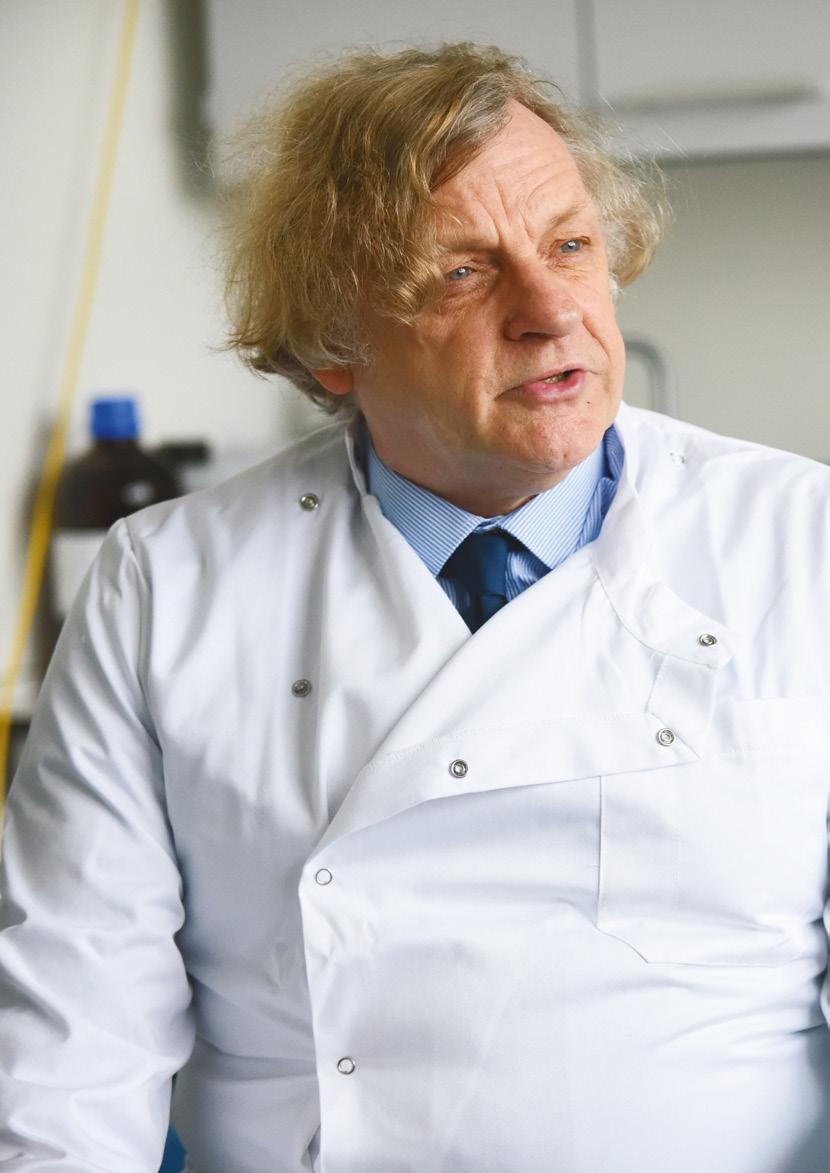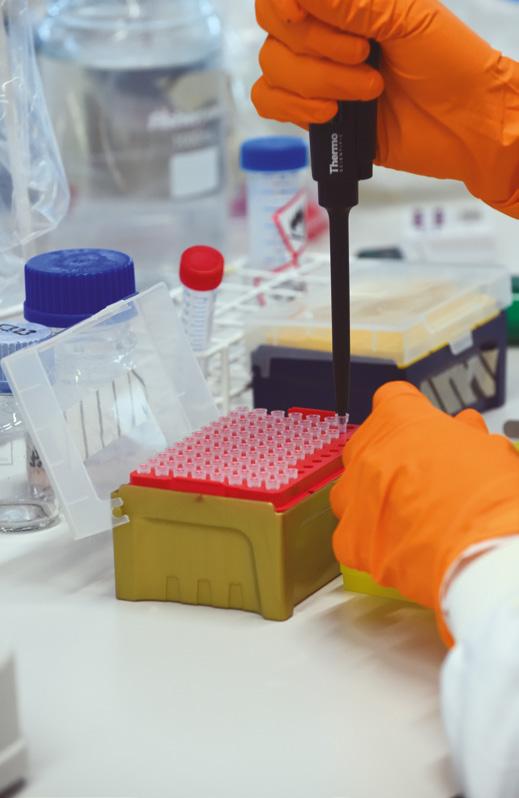
5 minute read
Tiger Test
Professor Colin Cooper, Chair of Cancer Genetics at UEA.
SOLVING THE RIDDLE
Advertisement
Thanks to UEA donors, our prostate cancer research is making great strides. At the next stage, a clinical trial will aim to prove the Tiger Test in a medical setting by 2022.
s I enter Professor Colin Cooper’s scientific research laboratories at The Bob Champion Research and Education Building for his Pioneer interview, I am met by a hive of activity. Research assistants and other scientists spin efficiently around me as if I am not there, so resolute is their focus on their work. Scanners and monitoring machines hum in a low harmony. Calculations are made. Notes are jotted. This, Professor Cooper says, is the focus that helped him and his team start making breakthroughs in prostate cancer that, they believe, will be revolutionary. “Thanks to the donations that we received, we’ve begun to solve the problem,” he smiles. “Now it’s about translating these early results into patient benefit.”
THE UK’S MOST COMMON CANCER IN MEN
In a long and varied career, Professor Cooper has made many breakthroughs. “I started my career looking at childhood sarcomas,” he begins. “Today, the solutions we came up with are used worldwide in diagnosis. Since then, we’ve worked with breast cancers, bladder cancer, kidney cancer and finally we ended up focusing on prostate cancer. “But, whereas I’d solved a lot of the problems for other cancers, we had great trouble with prostate cancer. There was a specific clinical problem here that needed my attention.” Our understanding of prostate cancer is lagging well behind other forms of the disease. In the UK, it’s the most common cancer in men and now causes more deaths than breast cancer. Half a million men are diagnosed in North America and Europe every year. Cases in Asia are rising.
CLEAR ROOM FOR IMPROVEMENT
Worse still, the current tests for prostate cancer are unreliable. Most prostate cancers are, in fact, near-harmless and could be safely managed with nothing more than regular check-ups with a doctor. Professor Cooper calls these ‘pussycat’ cancers. But current means of diagnosis don’t differentiate effectively between those and the aggressive 10% of prostate cancers that are life-threatening – or the ‘tiger’ cancers, as they have been nicknamed. u

u Professor Cooper explains, “Clinical trials have shown that for every 21 men who undergo surgery for prostate cancer – a painful operation that can lead to impotence and incontinence – just one man had a dangerous tiger cancer. There was never any need for the other 20 to go through radical surgery and radiotherapy.” It’s a terrible strain on the lives, health and wellbeing of men and their families. And it’s a shockingly inefficient use of hospital resources.
ANALYSING DATA WITH AI
The biggest issue in terms of the science, Professor Cooper explains, was that there was no way to interpret the data from a prostate cancer biopsy in the same way you can with, for example, a breast tissue sample. “From one patient, we get 70 DVDs’ worth of information and data,” he tells me. “And you’re only going to know what that data means when you’ve got the maths and computing to analyse it.” But, with prostate cancer, the established methods of genetic analysis were ineffective. It would take humans many lifetimes to pore through all that information. But advances in artificial intelligence allowed Professor Cooper and his team to spot patterns in global prostate cancer datasets, powered by up to 12% of UEA’s overall computing power for more than a year.
FIRST STEPS TO SOLVING THE RIDDLE
The team’s research has uncovered an aggressive form of prostate cancer, which Professor Cooper has termed DESNT, that carries the worst clinical
£2.2m
Tiger Test fundraising target
outcomes for patients. Early results show that the Tiger Test is able to spot it, and thus tell which men are at the highest risk of developing aggressive disease. Finally, the team has a method to tell the harmful prostate cancers from the harmless. If they complete the initial research phase, all that will be left to prove is that these astounding results can be reproduced in a medical setting safely and consistently. To get there, we will need to raise £2.2 million.
A THANK YOU TO DONORS
Sitting at the heart of the fourth most-cited UK city for research, our University was a perfect place for this project. But it also required substantial funding, which began with the Andy Ripley Memorial Fund that first established the research. Its continued progress is thanks to further generous donors. “The donations are what allowed us to do it,” Professor Cooper says, gratefully. “It is difficult to find traditional funding for the project because it’s not mainstream. But a lot of the things we’ve done that have seemed a bit ‘strange’ actually turned up with the solutions. We’re certainly living up to the UEA’s motto of ‘Do Different’! “I find the environment at UEA excellent. There is a lot of expertise here that you do not usually get in a cancer institute. And if it hadn’t been for the donations that we received, then the breakthroughs never would have happened.”
TRANSITIONING INTO BUSINESS
The project’s next stage will see the Tiger Test proved in clinical trials and then validated in commercial laboratories. For Professor Cooper, who is aiming to complete both the research and clinical trial by 2022, the health of men remains his top priority. “In the past, I’ve given my research to a company to develop. It was so problematic that I’ve decided to do it myself, with a team of professionals.” This way, he says, “you’ve got the freedom to go at your own pace and do it properly; philanthropy is the key to making that possible. “In the long run, I think it will bring more patient benefits to keep control and possession of the project within UEA. We can reinvest any returns into future cancer research at UEA.” In other words, a Tiger Test that doctors anywhere in the world will one day be able to use to save lives, prevent needless operations and understand prostate cancer better. To get there, we must set up a screening lab, begin the clinical trial and fund it to completion. This work starts with the order of a £145,000 scanner, made possible by donations. One thing seems certain. This inspirational scientist, a man who rises at 3am each day to begin work, won’t let anything get in the way of achieving that goal.

Left: Big C Atrium in The Bob Champion Research and Education Building, where the team are based.
Above: The team work in the building’s state-of-the-art labs.









